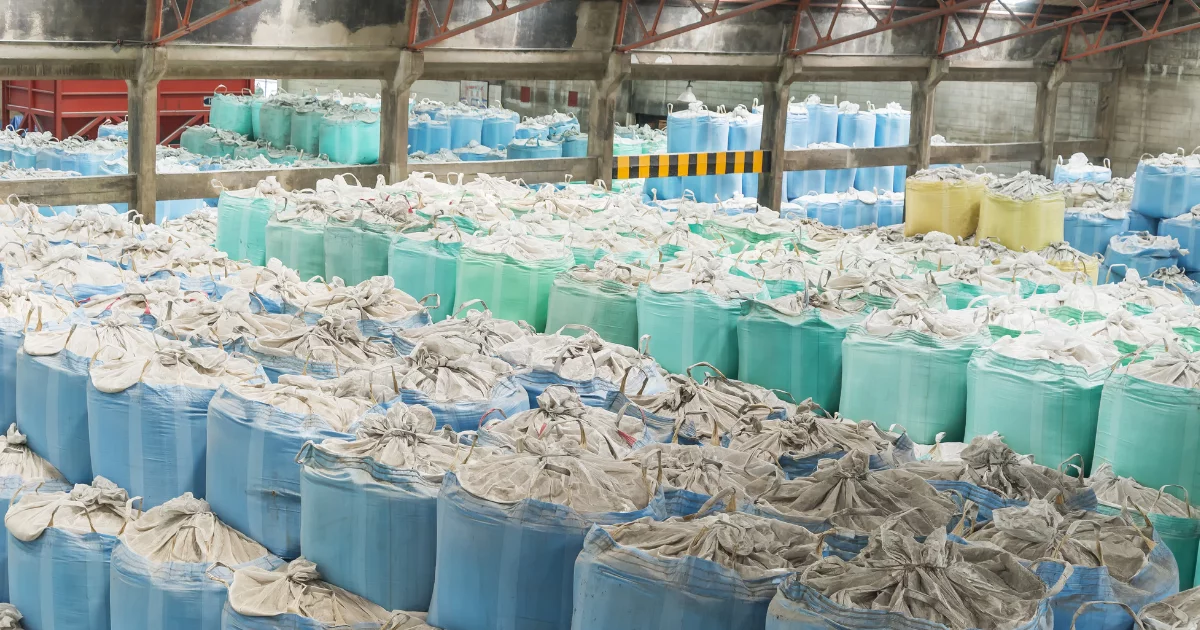Sustainable FIBCs: Protecting Our Planet from Waste

Park sustainable FIBCs to the side, for now. Instead, think about your storage and transport processes. How much do they waste in terms of materials, equipment storage, and reusability?
Some waste is obvious at first glance. Overpriced plastic containers or cardboard boxes stacking up in piles may make you rethink your container costs. Those same piles have recycling costs that can creep up on you. The cost creep continues to rise if you need multiple recycling pickups per week, or if you’re running out of space to keep everything.
As you evaluate business waste management and recycling plans, here are a few more questions and considerations to keep in mind. With flexible intermediate bulk container (FIBC) bags, most of your environmentally friendly manufacturing questions will be answered with simple solutions.
Sustainable FIBCs: Rethinking Waste, Recycling, and The Supply Chain
Do you have a nearby or on-site recycling center? How much of that recycling goes back into your business in the form of recycled materials? Are those materials useful for your business, or are they low-grade emergency-only options?
If your business hasn’t already perfected the recycling and reuse supply chain, it can get expensive. You need to prove that your recycled materials have the same or better structural integrity as before their destruction. If you’re using recycled materials for completely different purposes, they still need to meet the standards of those new purposes.
For many businesses, recycling and reusing are just throwing a bone to environmentalists. Creating generic blocks, beads, struts, and other materials that could be useful is less expensive than buying an industrial recycling service that delivers great materials at an unsustainable cost.
Is your business breaking even when it comes to recycling old containers? Do you consider a small loss from recycling a necessary tax to save the world -or to avoid even greater fines? If your business isn’t making significant gains from recycling containers, maybe it’s time to find another container.
FIBCs Are Sustainable, Flexible, And Compatible With Rival Options
Sustainability is key, and figuring out ways to extend the Earth’s resources while keeping your business profitable should be a long-term goal. It’s not just about extending beyond 10 or 20 years or even building an empire; legislation changes, public mindset, unplanned chain reactions from the environment, and other unknowns makes research into sustainability vital for pure industrialism, pure eco-friendly design, and everything in between.
Are FIBCs Environmentally Safe?
FIBCs are designed to be reusable and easily recyclable. For most industries, the major recycling challenge is finding an acceptable recycling center, maintaining a trash pile that isn’t overwhelming, and transporting materials for recycling.
Since FIBCs are lightweight and easily flattened, storage is similar to–or even better than–cardboard boxes and other flat paper products. Of course, the high strength and durable design make FIBCs a better option than carrying hundreds or thousands of pounds in an easily-crushed or torn cardboard box.
This comparison is where FIBCs really shine where it comes to environmental impact. They have the recycling center flexibility of cardboard boxes, but the strength of far more powerful shipping containers. Comparing FIBCs to more heavy-duty containers such as steel sea-worthy containers proves a different point since FIBCs weigh far less than metal containers and are easier to store.
Sustainable FIBCs Are a Middle-Ground, Then?
Calling FIBCs a good middle-ground is an understatement. When these versatile bags aren’t strong enough for massive filling and storage, they can still be used within containers that are big enough. If you want to fill entire trucks with materials for bulk transit, but want to deliver precise amounts of products for precise emptying, using FIBCs together with metal shipping containers is an easy choice.
Types of Sustainable FIBCs
Tally the above benefits with the low environmental impact of these FIBCs:
Sand Bags
Governments, organizations, and preparation-savvy individuals use sand bags for maximum defense and minimum cost during already expensive hurricane seasons.
Food Grade Bulk Bags
Dry and wet food packaging companies need food grade bulk bags that must not contaminate their products and materials for flavor, health, and compliance reasons. In both situations and more, there are FIBC options that can meet your needs.
Woven Polypropylene
Woven polypropylene rolls are a good option because of their high recyclability. FIBCs have high reusability, meaning that you won’t need to destroy the bags after one or two uses under proper handling guidelines. Polypropylene is a commonly recycled material, meaning that once FIBCs are beyond their normal lifecycle, you don’t need to hunt for specialty recycling centers across the world, or even across the region.
Once again, weight plays a factor. You’re using less fuel to transport recyclable bags, meaning that your business’s carbon footprint is smaller even if you factor in business partners and third-party contractors who handle your recycling.
Contact Palmetto Industries for your Sustainable FIBCs
Environmentally friendly design means taking control of your business processes and working directly with game-changing industry leaders. Don’t waste your time dealing with middlemen. As bulk bag manufacturers and distributors, we save you time and money. Contact Palmetto Industries at (706) 737-7999 to discuss what we can do for you.





